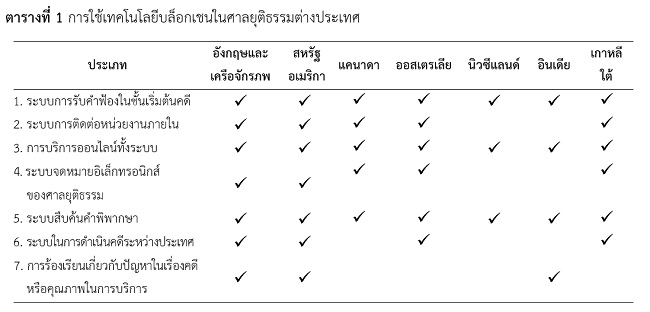การศึกษาการประยุกต์ใช้เทคโนโลยีบล็อกเชนในศาลยุติธรรมต่างประเทศ
DOI:
https://doi.org/10.14456/nrru-rdi.2021.2คำสำคัญ:
ศาลยุติธรรมต่างประเทศ, เทคโนโลยีบล็อกเชน, การประยุกต์ใช้บทคัดย่อ
การประยุกต์ใช้เทคโนโลยีบล็อกเชนในศาลยุติธรรมต่างประเทศ ส่วนใหญ่เป็นการนำมาใช้ประโยชน์เพื่อ 1) พัฒนาระบบการบริหารจัดการภายในหน่วยงานด้วยระบบอิเล็กทรอนิกส์ พัฒนาระบบรักษาความปลอดภัยให้เป็นระบบที่มีความเสถียร มีความน่าเชื่อถือ และสามารถตรวจสอบได้เพื่อให้เกิดความเชื่อมั่น โดยออกกฎหมายรองรับ มีการพัฒนาผู้เชี่ยวชาญเฉพาะด้านในการพัฒนาระบบ สนับสนุนให้เกิดการใช้งาน 2) พัฒนาระบบการติดต่อราชการทางอิเล็กทรอนิกส์การประสานงานระหว่างหน่วยงานในศาลยุติธรรมและการปรับปรุงกระบวนการทำงาน ทั้งภายในและระหว่างหน่วยงาน เช่น กระบวนการกลั่นกรองคดี กำหนดประเภท ขนาด และความยากง่ายของคดี และกระบวนการสอบสวน เป็นต้น 3) พัฒนาให้มีการนำเทคโนโลยีมาใช้ในศาลยุติธรรมรวมทั้งการพัฒนาหรือนํามาใช้ซึ่งเทคโนโลยีที่สามารถใช้ในการยืนยันตัวตน และตรวจสอบลายมือชื่อ 4) พัฒนาเว็บไซต์แต่ละหน่วยงานในศาลยุติธรรมให้มีเนื้อหาที่มีประโยชน์ต่อทุกฝ่าย โดยเฉพาะกฎหมายที่เกี่ยวข้องกับศาลยุติธรรม และ 5) พัฒนาระบบเทคโนโลยีบล็อกเชนเพื่อลดขั้นตอนและเพิ่มประสิทธิภาพในการบริหารจัดการภายในศาลยุติธรรม เช่น ระบบการบริหารจัดการคดีอิเล็กทรอนิกส์หรือระบบการติดต่อราชการทางอิเล็กทรอนิกส์ เป็นต้น โดยการบูรณาการระบบฐานข้อมูลศูนย์กลางเพื่อการจัดเก็บ รวบรวม แลกเปลี่ยน เชื่อมโยงสถิติข้อมูลศาลยุติธรรมดิจิทัลภาครัฐในรูปแบบและภาษาที่เป็นสากล มีความถูกต้องเป็นปัจจุบันบนแพลตฟอร์ม ที่เป็นมาตรฐานเดียวกัน จัดสรรงบประมาณให้เพียงพอสำหรับการจัดซื้อและบำรุงรักษาให้ทันสมัยอย่างต่อเนื่อง เพื่อให้คอมพิวเตอร์และระบบต่าง ๆ มีเสถียรภาพสูงใช้งานได้อย่างมีประสิทธิภาพ อันจะทำให้สามารถลดโอกาสเกิดข้อผิดพลาดทางด้านเทคนิค ร่วมกับการเพิ่มขีดความสามารถให้ครอบคลุมสมรรถนะดิจิทัลของผู้เกี่ยวข้องด้านเทคโนโลยีสารสนเทศดิจิทัลในทุกระดับด้วยข้อมูลความจริงเชิงประจักษ์
เอกสารอ้างอิง
Anderson, J. E. (2011). Public Policy-Making: An Introduction (7thed.). Boston, MA : Cengage.
Bruns, H. J. (2013). Accounting change and value creation in public services do relational archetypes make a difference in improving public service performance? Critical Perspectives on Accounting. Public Management Review, 6(3), 331-348.
Chadkrabuanpol, S. (2012). Court system and general principles on judicial procedure. Bangkok : Thammasat Publishing. (In Thai)
Chuenchitsiri, C. (2017). Academic explanation (4th ed.). Bangkok : Winyuchon. (In Thai)
Chuttur, M. Y. (2009). Overview of the Technology Acceptance Model: Original, Developments and Future Directions. Sprouts : Working Papers on Information Systems.
Crosby, M., Pattanayak, P., Verma, S., & Kalyanaraman, V. (2016). Blockchain Technology : Beyond Bitcoin. Applied Innovation, 2(6-10), 71.
Deloitte, P. (2018). Blockchain in Public Sector: Transforming Government Services through Exponential Technologies (pp. 1-28). India : Deloitte Tohmatsu Limited.
Ekblaw, A., Azaria, A., Vieira, T., & Lippman, A. (2016). MedRec: Medical Data Management on the Blockchain. In 2016 2nd International Conference on Open and Big Data (OBD), 22-24 August 2016. Austria : Vienna.
Graglia, J. M., & Mellon, C. (2018). Blockchain and Property in 2018: At the End of the Beginning. Innovations: Technology, Governance, Globalization, 12(1-2), 90-116.
He, H., & Baruch, Y. (2009). Transforming organizational identity under institutional change. Journal of Organizational Change Management, 22(6), 575-599.
Iansiti, M., & Lakhani, K. R. (2017). The Truth AboutBlockchain. Harvard Business Review, 95(1), 118-127.
Nilthongkam. (2019). Code of Civil Procedure Criminal procedure Statute of the Court of Justic Version 1. 62. Bangkok : Athaya Millennium. (In Thai)
Office of National Digital Economy and Society Commission. (2018). National Digital Economy and Society Development Plan and Policy (2018-2037). Bangkok : Ministry of Digital Economy and Society. (In Thai)
Office of the National Economic and Social Development Conuncil. (2020). Economic and Social Development. Retrieved January 9, 2020, from http://www.nesdb.go.th/default.aspx (In Thai)
Office of the Public Sector Development Commission. (2019). Public Sector Management Quality Award. Bangkok : Office of the Public Sector Development Commission. (In Thai)
Shrier, D., Wu, W., & Pentland, A. (2016). Blockchain & infrastructure (identity, data security). Massachusetts Institute of Technology-Connection Science, 1(3), 1-19.
Thikhauttmakron, S. (2018). Complete Statute of the Court of Justice (3rd ed.). Bangkok : Law Book Store. (In Thai)
Vayupab, P. (2016). Explanation of the Court System and the Statute of the Court of Justice (12th ed.). Bangkok : Winyuchon. (In Thai)
Vayupab, P. (2017). Explanation of the Court System and the Statute of the Court of Justice (13th ed.). Bangkok : Winyuchon. (In Thai)
Wooten, K. C. (2009). Ethics and justice in new paradigm and postmodern organization development and change. In Research in organizational change and development. N. P. : Emerald Group Publishing Limited.
Wuttisil, K. (2017). Guidelines for decision-making to use blockchain technology. Thesis, Master of Science Program in Computer Science, King Mongkut’s University of Technology Thonburi, Bangkok. (In Thai)
Zheng, Z., Xie, S., Dai, H. N., Chen, X., & Wang, H. (2018). Blockchain challenges and opportunities: A survey. International Journal of Web and Grid Services, 14(4), 352-375.





